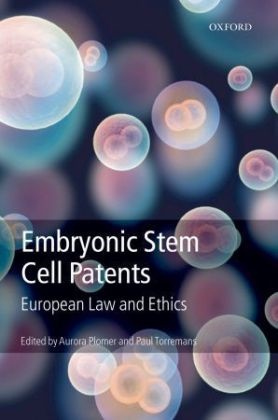Read more
Plomer and Torremans collection helpfully concentrates the mind on a number of key questions Informationen zum Autor Professor Dr Aurora Plomer is Chair in Law and Bioethics and the Director of Sheffield Institute of Biotechnology Law and Ethics at The University of Sheffield. She has a dual background in Philosophy and Law. She is the Coordinator of a European FP6 funded project: Stem Cell Patents: European Patent Law and Ethics.Professor Dr Paul Torremans is City Solicitors' Educational Trust Professor of Intellectual Property Law at the School of Law of the University of Nottingham and Professor of Private International Law at the Faculty of Law of the University of Ghent (Belgium). The first comprehensive interdisciplinary analysis of the EU patent system as applied to biotechnological inventions, and the legal and ethical controversies arising from overlapping law regimes in the morally fragmented and contested field of human embryonic stem cell related technology. Zusammenfassung Stem cell research, and particularly embryonic stem cell research, whilst offering the prospect of developing theories for serious life-threatening diseases, also raises a number of difficult and controversial moral questions. This is reflected in a variety of moral perspectives and regulatory regimes, already adopted or in the process of being developed, in EU Member States. In particular the "moral exclusion" clause in Article 6 of the EC Directive on the legal protection of biotechnological inventions has created much uncertainty in this field.This collection of original essays provides comprehensive analysis of the EU patent system as applied to biotechnological inventions and particularly stem cell research, dealing with the overlapping EPC, EU, international and national law regimes bearing on the exclusion of patents in a morally fragmented and contested field. In this multidisciplinary study, the editors aim to clarify the legal scope of Article 6, which they deem essential for the fostering of research and investment in Europe, whilst ensuring that such research is conducted within clear ethical limits which address the concerns of society. As well as a complete overview of the application of the European patent law in the field of human embryonic stem cells, topics covered include legal and philosophical accounts of the boards of the European Court of Justice and European Patent Offices' reasoning in the leading litigated cases, as well as the institutional tensions between national and transnational European research and patent regimes. With its broad research in the fields of patent law, ethics and philosophy, the book analyses a wide range of issues in a way no other book has previously done and suggests solutions to unblock the current stalemate surrounding the patentability of human embryonic stem cell related inventions. The book will be welcomed by a broad readership, including experts and academics in both ethical and legal disciplines as well as policy makers and regulators in the field of embryonic stem cell research in Europe....

